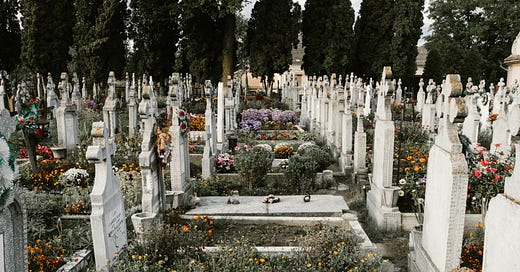Belief and the Grave
Oct 1: Memorial of Saint Thérèse of the Child Jesus, virgin and doctor of the Church
The first reading and psalm are some of the most depressing passages found anywhere in the Bible. Of the 88th Psalm, James Burton Coffman wrote, “We have never read a passage describing the approach of death any more impressive than this one.”
But then the Gospel characteristically offers hope. That’s what Jesus came for, after all.
Reading 1
Jb 3:1-3, 11-17, 20-23
Job opened his mouth and cursed his day. Job spoke out and said: Perish the day on which I was born, the night when they said, “The child is a boy!” Why did I not perish at birth, come forth from the womb and expire? Or why was I not buried away like an untimely birth, like babes that have never seen the light? Wherefore did the knees receive me? or why did I suck at the breasts?
For then I should have lain down and been tranquil; had I slept, I should then have been at rest With kings and counselors of the earth who built where now there are ruins Or with princes who had gold and filled their houses with silver.
There the wicked cease from troubling, there the weary are at rest.
Why is light given to the toilers, and life to the bitter in spirit? They wait for death and it comes not; they search for it rather than for hidden treasures, Rejoice in it exultingly, and are glad when they reach the grave: Those whose path is hidden from them, and whom God has hemmed in!
Job says he wants the easy way out. He wants to end his suffering by not being alive anymore. He does not, however, consider suicide. Even in his grief, Job acknowledges the power over life and death belongs only to God.
Responsorial Psalm
Ps 88:2-3, 4-5, 6, 7-8
R. (3) Let my prayer come before you, Lord.
O LORD, my God, by day I cry out;
at night I clamor in your presence.
Let my prayer come before you;
incline your ear to my call for help.
R. Let my prayer come before you, Lord.
For my soul is surfeited with troubles
and my life draws near to the nether world.
I am numbered with those who go down into the pit;
I am a man without strength.
R. Let my prayer come before you, Lord.
My couch is among the dead,
like the slain who lie in the grave,
Whom you remember no longer
and who are cut off from your care.
R. Let my prayer come before you, Lord.
You have plunged me into the bottom of the pit,
into the dark abyss.
Upon me your wrath lies heavy,
and with all your billows you overwhelm me.
R. Let my prayer come before you, Lord.
Ancient Israelites feared that death separated them from God. The Psalmist felt like he was already dead, and no one, not even God, was listening.
Jesus brings hope from beyond the grave, that our suffering in this life isn’t for nothing.
Alleluia
Mk 10:45
R. Alleluia, alleluia.
The Son of Man came to serve
and to give his life as a ransom for many.
R. Alleluia, alleluia.
Jesus says this in the context1 of instructing His disciples to not rule the Gentile tyrants do, who “their authority over them felt.”
Instead, Jesus is gentle. He doesn’t call down a rain of hellfire on non-believers.
“What an oddly specific thing to say, Matt,” I assume you’re thinking right now. Not so! Read on to find out why…
Gospel
Lk 9:51-56
When the days for Jesus to be taken up were fulfilled, he resolutely determined to journey to Jerusalem, and he sent messengers ahead of him. On the way they entered a Samaritan village to prepare for his reception there, but they would not welcome him because the destination of his journey was Jerusalem. When the disciples James and John saw this they asked, "Lord, do you want us to call down fire from heaven to consume them?" Jesus turned and rebuked them, and they journeyed to another village.
A little bit earlier in this chapter,2 Jesus asked the disciples, “Who do the crowds say that I am?” One of the rumors going around was that He was Elijah.
This scene shows that he is definitely not Elijah. When he was confronted with an unbeliever in Samaria,3 Elijah called down fire from heaven, like the disciples suggested, and killed over a hundred soldiers.
Jesus doesn’t react the same way. Remember, He was rejected in His own home town when he started out;4 here He is, getting rejected at the end of His mission, too. But Jesus isn’t here to destroy sinners. He wants them to repent, and for that, he needs to give them time and space to figure it out.
We need that, as well. We should be glad Jesus isn’t vengeful, and judge us for what we justly deserve.



